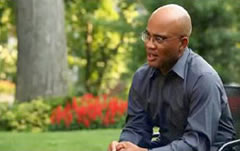Tourette Syndrome: Mike's Story
 Tourette Syndrome Awareness month is May 15-June 15. Read Mike's story and find out what CDC is doing to raise awareness and educate health and education professionals about Tourette Syndrome.
Tourette Syndrome Awareness month is May 15-June 15. Read Mike's story and find out what CDC is doing to raise awareness and educate health and education professionals about Tourette Syndrome.
Tourette Syndrome is a disorder that affects the nervous system. People with Tourette Syndrome have movements and vocalizations they cannot control, called motor and vocal (or phonic) tics. Tourette Syndrome is often associated with at least one additional mental, emotional, or behavioral condition such as ADHD and Obsessive Compulsive Disorder.
Mike's Story
Tourette Syndrome: Overcoming the Odds
"My name is Mike Higgins and I am a father, a pastor, a husband, a dean of students of a seminary, a minister, a full colonel in the United States Army, and I have Tourette Syndrome.
"The first time I heard the word 'Tourette Syndrome' from the doctor I had no idea what he was talking about. I had never heard of it. I didn't know anybody who had ever heard of it before. There were a lot of days as a 12 year-old when I would lay in bed and think about what was happening to me that I could not control. It caused me to wonder, 'Why was I born like this?'
"I think that I was not diagnosed until I was 28 years old because our family doctors didn't know about Tourette Syndrome. I had been training for three weeks in Death Valley, California, and I was really hot, really dirty, really tired, and my tics were all over the place. My battalion commander noticed and ordered me to get checked out. Finally, I met a neurologist who asked me if anybody in my family had ever had this. I told him that my grandfather did. And he said, 'I think I know what you have.'
"I didn't think that I was ever going to be married because it seemed like it was hard enough to just be single with Tourette Syndrome. But in my family life now, it's just who I am. I think that my wife Renee is such a spiritually mature woman and I still look up to her because she's been my champion in all of this, helping me along, and has really been there by my side. She has never treated me as a victim and refuses to let me be a victim.
"The churches that I've been in have very celebratory worship styles. When I'm preaching, I don't tic a lot; sometimes not at all. It seems like there's a grace period I get when I'm focused on something that I'm passionate about. If we can educate the ministers, pastors, and religious leaders about Tourette's, then they can go on to educate folks in their congregations, families of children with Tourette's, and also folks who don't understand Tourette's.
"I don't think Tourette's takes away your dreams. I just think that it may put an extra wall or two between you and accomplishing your dreams. But you can get over the walls. As I say, 'You may have Tourette Syndrome, but it doesn't have to have you.'"
CDC would like to thank Mike Higgins and the National Tourette Syndrome Association (TSA)for sharing this personal story.
Increasing Awareness and Understanding
Did You Know?
- 3 of every 1,000 children 6 through 17 years of age have been diagnosed with Tourette Syndrome; this represents approximately 148,000 U.S. children.
- Tourette Syndrome is three times more common among boys than among girls.
- Tourette Syndrome affects all racial and ethnic groups; however, Hispanic children and non-Hispanic Black children are less likely to be diagnosed than non-Hispanic White children.
- Although tic symptoms can decrease as a child reaches adulthood, related conditions like obsessive compulsive disorder may continue to have a substantial impact on a person’s life.
Tourette Syndrome can make it difficult for children and adults to fit in, particularly when people don’t understand the condition. Awareness and education of peers and teachers are critical for helping people with Tourette Syndrome become more accepted and understood, and succeed in school.
Tourette Syndrome is complicated to diagnose and treat and many health care professionals may be unaware of the best way to manage Tourette Syndrome. There is no known cure for Tourette Syndrome, but there are behavioral treatments and medications that can lessen the symptoms and help people with Tourette Syndrome lead healthy and successful lives.
To ensure that children and adults living with Tourette Syndrome reach their full potential for healthy and productive lives, CDC’s National Center on Birth Defects and Developmental Disabilities partners with and provides funding for the Tourette Syndrome Association (TSA) to provide much needed educational programs. The goal of these programs is to increase awareness and acceptance of Tourette Syndrome, access to health services, and opportunities to succeed in school and work. The program provides education for health and school professionals, people with Tourette Syndrome, their families, and the general public about the recognition, diagnosis, and treatment of this condition.
The CDC-TSA outreach program has conducted over 520 education programs for 32,000 professionals and community members throughout the U.S. and makes special efforts to reach out to minority and underserved communities. Participants of the program have reported learning new information on Tourette Syndrome diagnosis and treatment, improving their skills, and changing their practice in working with people with Tourette Syndrome.
- 70% of health care professionals and over 80% of educators reported an increase in their knowledge and understanding of Tourette Syndrome.
- 82% of health care professionals and 86% of educators reported that they planned to use what they learned with their patients or students with Tourette Syndrome.
- 76% of parents who attended community programs reported that they planned to use what they learned to manage their child’s Tourette Syndrome, and 81% planned to use what they learned to address a specific need or concern.
Education and outreach is just one aspect of CDC’s work on Tourette Syndrome. NCBDDD is working to improve the lives of individuals with Tourette Syndrome and their families, and help create communities and institutions that support the potential for full, productive living for people with this condition. Early and appropriate identification and management can limit the impact of Tourette Syndrome and the associated conditions on individuals, their families and communities.
More Information
- Tourette Syndrome Home
- Tourette Syndrome and Public Health
- Treatments
- Data and statistics
- CDC-TSA Education and Outreach Program
- National Tourette Syndrome Association, Inc.
- Attention-Deficit/Hyperactivity Disorder (ADHD) Home
- CDC’s National Center on Birth Defects and Developmental Disabilities
- Get Involved: Send an E-card
CDC works 24/7 saving lives and protecting people from health threats to have a more secure nation. A US federal agency, CDC helps make the healthy choice the easy choice by putting science and prevention into action. CDC works to help people live longer, healthier and more productive lives.
Get email updates
To receive email updates about this page, enter your email address:
Contact Us:
- Centers for Disease Control and Prevention
1600 Clifton Rd
Atlanta, GA 30333 - 800-CDC-INFO
(800-232-4636)
TTY: (888) 232-6348 - cdcinfo@cdc.gov
 From the
From the 


